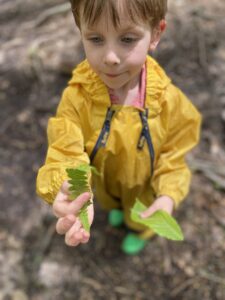At Placework we think deeply about the assets of the natural world and how we can act as responsible stewards so that future generations can inhabit thriving natural ecosystems that coexist with the built environment.
Nature-Based Education
February 23, 2023
“It was a life changing day – seeing what can happen outdoors, feeling how it impacted me, and how it seemed to be impacting the children,” says architect Alice Carey as she reflects on enrolling her child in a forest preschool almost a decade ago. “I volunteered at first, but fast forward to now, I am delivering outdoor education and learning more all the time.”
As a parent, Alice’s experience of being out in nature began as a self-described “appreciator” but soon she turned her passion into advocacy. Utilizing her training as an architect, she petitioned her local public school system to foster students’ connection to the outside world by transforming an adjacent forest into a learning habitat. “I didn’t realize that by making a suggestion, that someone might just say, ‘Ok, but you have to do it.’” Alice rose to the challenge with her knowledge of places and possibilities at her side when she approached her municipality’s planning department.
Alice describes how some of the educators, and parents, were timid at first, “but there’s this undercurrent of desire for it because we seem to intuitively understand the benefits of being outside and learning in a physical environment.” Research from the North American Association for Environmental Education (NAAEE) has shown that outdoor learning benefits not only academic performance but also student mental health. Student focus and calmness increase when learning in nature, and teachers have reported better behavior and social interactions with fewer disciplinary issues. “I had my hunches but through observation, and further reading, the children in these programs are much stronger,” says Alice, “both physically, with balance, but also mentally.” She has seen first hand that her own children, and their peers, are able to solve problems and activate their imagination much more readily. “It seems like having time to play and do your own thing is such an essential part of becoming a person, and that if they’re deprived of that too soon there’s a lot lost.”
At Placework we think deeply about the assets of the natural world and how we can act as responsible stewards so that future generations can inhabit thriving natural ecosystems that coexist with the built environment. We are, after all, part of nature, not separate from it. And so too are the buildings and places that we design. Several tenets central to outdoor education also align with values held at Placework. “All of these core practices of expressing gratitude for something that you see, taking time to stop and connect yourself to where you are and the other people around you. It’s about tuning in to all of your senses – what you hear, see, feel. I think that we, at Placework, aspire to design spaces that help someone to do that, to understand their place in the world. I think those are the best buildings, the ones that help us make connections like that.”
Placework recently started collaborating on a new childcare center with the City of Lebanon, where Alice will have the opportunity to bring her expertise as an architect and her developing skill as an outdoor educator together. She is bringing her questions to the project team. “I am interested in asking, ‘is the environment helping us make this project?’ There’s a lot of opportunity to think differently about how we approach the work, but right now I feel like we’re standing on the edge of something huge.”
For Alice, coming back to intention is key. “What the project is about, what it will really deliver for our clients, the end-users, and the wider community has to be present right from the start.” At the recent kickoff meeting, Alice took the opportunity to turn the conversation towards the educational model, and the room became activated. “We’d taken it from a conversation about a building, to one about the possibilities of education, and a real vision started to form.”
With several projects on our horizon that bring learners out into the natural world, Alice is considering what success will look like for her.“ As an advocate and educator, I would love to turn attention to the natural world as a vibrant classroom.” Her vision is also firmly rooted in the role equity plays in this work. “Right now, nature-based education typically only serves a privileged group and is only present in some communities.” Alice believes there’s no reason why it shouldn’t be available to everyone. “Our work over the course of these projects will be to remove barriers to the natural environment as an educational space, for all.”
To hear more about our upcoming projects, sign-up for our quarterly newsletter.
Resources
Explore these free online resources from the National Outdoor Learning Library
Listen to curriculum expert Gerald Liberman discuss environmental education.
